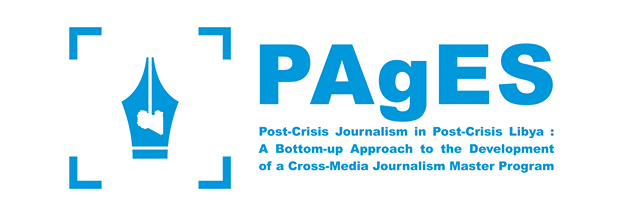
MISSION

PAgES aims at contributing to the modernization of the HE in Libya through a bottom-up approach for the design and pilot of a Master Course in Cross-Media Journalism. The Master targets young people studying communication and young professionals, who wish to specialize in the strategic field of digital journalism. The Master Course will be designed by means of a participatory approach, involving teachers from the EU and Libya, students and journalists. Teachers will be provided with the required skills for the delivery of the Master Course through a set of CB initiatives: online Repository for Training Faculty, online Space for discussion and study visits at two EU universities. The length of the Master Course is of 2 years (120 ECTS), and it will be taught in English. The aim of the project is to promote a local expertise, and we expect the Master to be held in all Libyan Universities. The first year will be piloted during the lifetime of the project.
Wider Objective: To contribute to the modernization of HE in Libya and support the implementation of the Bologna Process. To improve Journalistic skills of Libyan youth in order to contribute to the democratization process of the country.
The Libyan condition is aptly described by Freedom House:
“The fall of the Qadhafi regime lifted restrictions on the long-repressed media sector. Citizen journalism became more common, and media outlets ranging from satellite television and radio stations to print publications multiplied in number. However, media freedom is increasingly limited by political and criminal violence that has made objective reporting dangerous. Many journalists and media outlets have censored themselves” (Freedom in the World Report, 2017).
After the fall of the regime, things have become even more complicated: reporters may not be censored, but “they censored themselves”. According to Reporters Without Borders, “political impasse” is making journalism risky and difficult: in 2017 Libya ranks 163 out of 180 countries in the World Press Index, while it ranked 155 in 2011, the year of Qaddafi’s death, and 131 in 2013 (World Press Index 2017). The end of dictatorship triggered many hopes, but institutional change could not provide society with all instruments necessary to political debate. It would be naive, on the other hand, to put faith on technology, according to a misunderstood Internet-centrism: social media can be a powerful tool, but people must be trained to fully understand their utility. It is necessary to define new skills and engender a new awareness of the part played by information in the building of a democratic country. Euro- Mediterranean cooperation is of paramount importance, with respect to this goal.
Specific Objectives:
- To exchange best practices in the field of HE and cross-media journalism by means of an analysis of the state of the art;
- To create or improve Multimedia Labs in Libyan Universities to support technical training;
- To build capacities of staff through a training framework and study visits at the EU universities;
- To develop a curriculum in Cross-Media Journalism based on a wide consultation;
- To set-up and offer a Master Program in Cross-Media Journalism in Libya.
